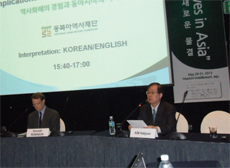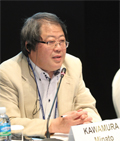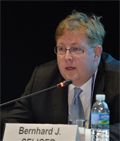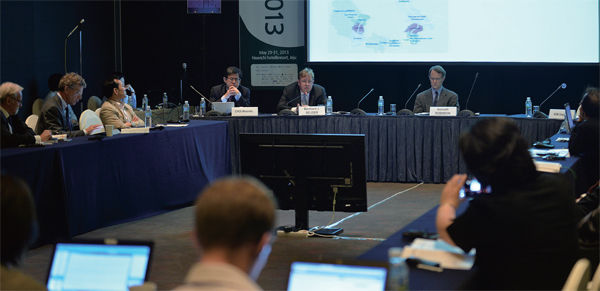동북아역사재단 2013년 07월호 뉴스레터
- Written by Lee Jong-guk, Research Fellow at NAHF Office of Policy Planning

At the 8th Jeju Forum for Peace and Prosperity (May 29-31, 2013), the NAHF organized two sessions. The following is a summary of the objectives and details of these two sessions, and what was discussed at the sessions and it implications.
To start with, NAHF President Kim Hakjoon gave an opening speech for the NAHF sessions, in which he noted that East Asian conflict was intensifying because no reconciliation in true sense had been achieved over historical issues, and stressed that this situation ran counter to the global trend. He talked about how the U.K. had admitted to its crime committed against humanity on Kenyans under imperial colonial rule and promised an apology and compensation, and stressed that those in power in Japan should also honestly admit to Imperialist Japan's wrongdoing against Korea and promise not to repeat such wrongdoing.
Historical and Territorial Issues Arising in East Asia Also of Global Concern
The first session held on Day 2 (May 30), titled 'Historical Reconciliations and Implications for the Future of East Asia,' noted that not only the rise of East Asia but historical and territorial issues within the region were drawing global attention, and proposed historical reconciliation as a way to overcome historical conflicts in East Asia. The historical and territorial issues of East Asia are so serious that they are hindering the possibility of economic prosperity and cooperation in this region. The historical conflicts of this region are not getting resolved with time; they are becoming even worse. If the current situation is getting in the way of mutual cooperation among the nations of this region, it is necessary to make efforts to find the path to reconciliation.
In this session, moderated by NAHF Visiting Fellow Dr. Kenneth Robinson, Director of Hanns Seidel Foundation Korea Office Dr. Bernhard Seliger explained the European examples of reconciliation between France and Germany and reconciliation between Germany and Poland, and what implications they could give East Asia. He also explained that France and Germany, long-time enemies in history, had turned their hostile relationship into a friendly one, and stressed that what contributed to reconciliation between the two nations was their relationship as economic partners. He also stressed that the French and German citizens, although living in different countries, were making a substantial amount of direct investment in the other country, and that Schmidt and French leaders had maintained a friendly relationship both professionally and personally.


from a lack of historical consciousness of his generation.
Japan has politicians like him because it failed to teach post-war generations properly
about modern and contemporary history."
Start from Common Issues with Forward-Looking Attitude for Resolution of Historical Conflicts
What lessons can we learn from it? First of all, we need to start with easy rather than difficult issues first, and then look at common elements in history. Explaining history exactly is an extremely difficult thing to do; there can be many far-fetched interpretations and extremely biased viewpoints. Therefore, we need to start with common issues and move forward into the future without dwelling too much on the past. For example, Germany, even though whether they made compensation properly remains controversial, is considered to have made forward-looking moves. Efforts need to be made to improve mutual understanding. And Dr. Kenneth Robinson said that the importance attached to teaching national history in high school in East Asian countries seemed to cause difficulty in teaching the history of neighboring countries, made the following case: since trying to explain some aspects of the history of one's own nation in the larger context of East Asian history could be a waste of time, one should focus on large pictures rather than national history in order to review historical issues in regional contexts. And he explained that by reading and learning different viewpoints presented in the high school history textbooks of neighboring countries, teachers and students alike could study different perspectives and understand how history is accepted in other countries.
The second session on Day 3 (May 31), titled 'Modern East Asia, the East Asian Region and New Leaders,' noted that recent discussions of East Asia were going beyond general discourse and move toward a regional community, toward peace, and toward the stability of the region. Against this background, this session discussed the past, present, and future of East Asia within the time frame of the modern period.
For a start, Professor Kawamura of Hosei University, while describing East Asia as a concept that encompasses Northeast Asia and Southeast Asia, stressed that East Asia was expected to see development and prosperity and also likely to face war, conflict, political difficulty and confusion more than any other region in the world. And East Asia, he explained, while sharing cultural similarity, is marked by gaps in economy and culture. Finally, he explained that the purpose of such exchange, despite the existence of contradictions, exists for mutual understanding within East Asia, and argued that although there are already social and cultural leaders with insight into the future of the region as a whole, the future calls for leaders who will seek mutual understanding. Professor Song ChengYou of Peking University explained modern China's perception of the world and East Asia. This topic was actually very relevant to the reality we faced. In history, he explained, it was around the 17th century that China started perceiving the world for the first time. It was during the Opium Wars, he stressed, that there was a change of China's perception of the world and East Asia. In other words, the Opium Wars marked the beginning of modern China, and in the process, he asserted, Chinese perceived the world and East Asia in five different kinds.
NAHF Research Fellow Bae Sungjoon explained that discussions explaining the unity and solidarity of Asia had been expressed and practiced as Asianism. However, he stressed, even while Asianism was under discussion, conflict and exclusivism had persisted in East Asia. Bae explained why conflict and violence outweighed the discussion of unity or solidarity, stressing that the acceleration of democracy from the 19th century onward should be discussed in terms of East Asia. NAHF Research Fellow Kim Hyun-chul explained how much the East Asian community, tripartite (Korea-China-Japan) cooperation and integration had been discussed lately, with focus on finding out from when in post-modern times such discussion had started among the three East Asian nations. He gave a detailed explanation of who those Koreans were, especially in Enlightenment Faction, who had gone to the Japanese "Rise Asia Society" meetings held in Japan in the early 1880s and why they had gone there. By doing so, he attempted to show how the justification of regional cooperation among the three East Asian nations in modern history differed from reality.
How to Make a Successful Model Out of the Tragic Discussion of East Asia
At this forum, East Asia and its 100-year history from modern to contemporary times were the topics of discussion; it was discussed how to understand the modern and contemporary history of East Asia from 1880 onward till present, and how to make a successful 21st-century model out of the discussion of East Asia that ended tragically. The Jeju Forum for Peace and Prosperity sought ways to continue international exchanges in East Asia, and served as a very important opportunity to understand the cultural exchanges in modern and contemporary history through the exchange of ordinary citizens as well as intellectuals.



